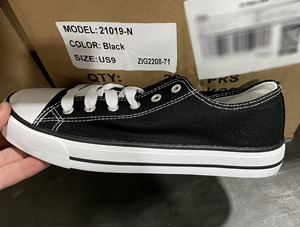Baltimore US CBP Officers Seize $314K in Counterfeit Converse-like Sneakers
Imitation is the sincerest form of flattery, but we’re sure Chuck Taylor would come apart at the seams if he saw these knockoffs of his long beloved sneaker.
U.S. Customs and Border Protection (CBP) officers in Baltimore seized a Los Angeles-bound shipment of 13,660 pairs of canvas-topped sneakers on Friday that violated the trademarked Converse midsole design. If authentic, the sneakers would have been valued at more than $314,000.
CBP officers initially inspected the shipment, manifested as “shoes,” on June 23 after it arrived from China. Officers suspected the sneakers to be counterfeit and detained the shipment. Officers then submitted photos and documentation to CBP Office of Trade’s Intellectual Property Enforcement Branch (IPE) for an infringement determination.
On June 27, the IPE Branch confirmed that the shipment violated Converse’s trademark. Officers inventoried the entire contents of the shipment and on July 18 submitted an inventory list and pictures for appraisal to CBP’s trade experts at the Apparel, Footwear, and Textile Centers of Excellence and Expertise (CEE).
On July 2019, a CBP import specialist appraised the sneakers at $314,180 manufacturer’s suggested retail price, if authentic.
CBP officers seized the counterfeit Converse sneakers. No one has been criminally charged.
“Unscrupulous manufacturers and vendors illegally profit on the sale of substandard counterfeit products, such as these fake Chucks, at the expense and safety of American consumers,” said Adam Rottman, CBP’s Area Port Director for the Area Port of Baltimore. “Customs and Border Protection urges consumers to protect their health and wallets by buying authentic consumer goods from reputable or authorized vendors.”
The international trade in counterfeit consumer goods is illegal. It steals revenues from trademark holders, steals tax revenues from the government, funds transnational criminal organizations, and the unregulated products potentially threaten the health and safety of American consumers. Counterfeit consumer goods may also be sourced or manufactured in facilities that employ forced labor.





